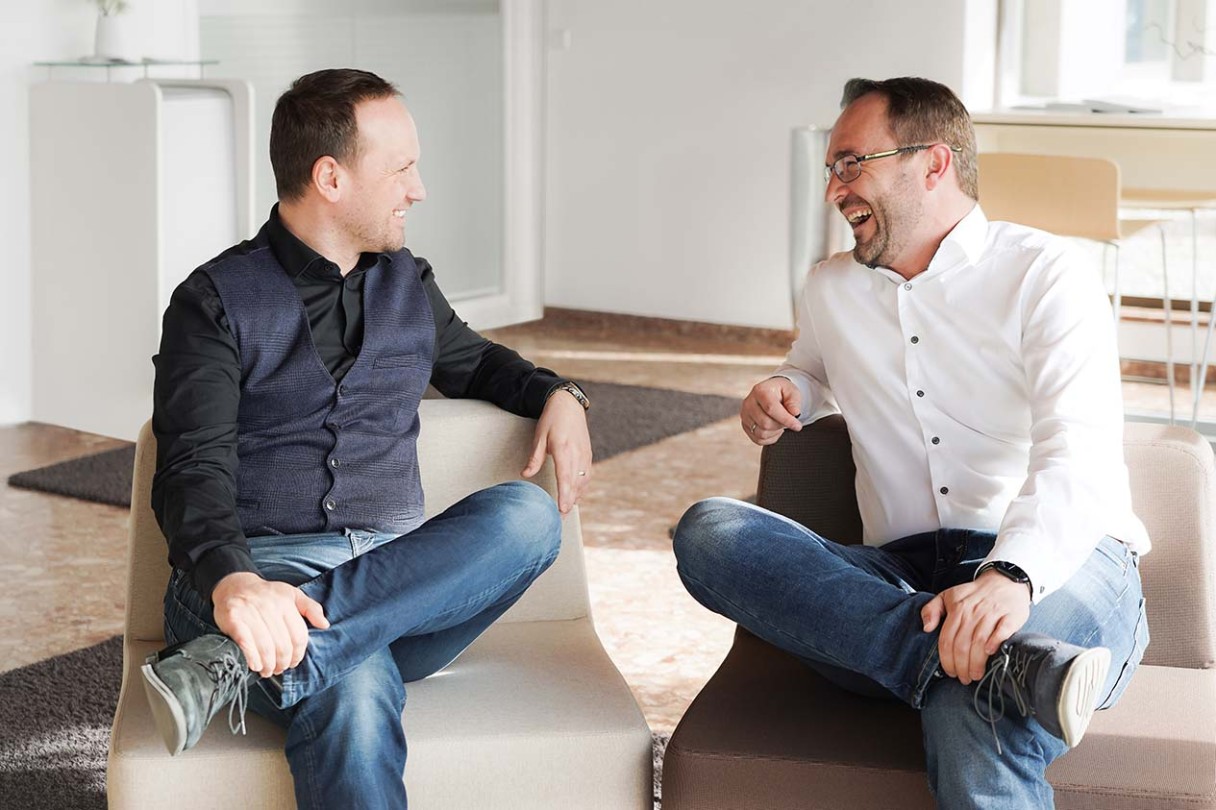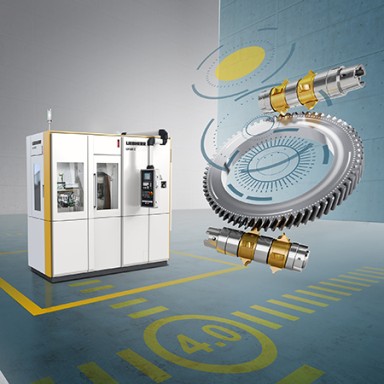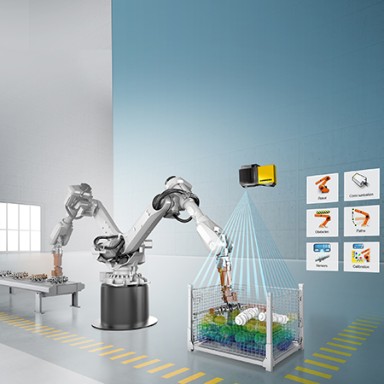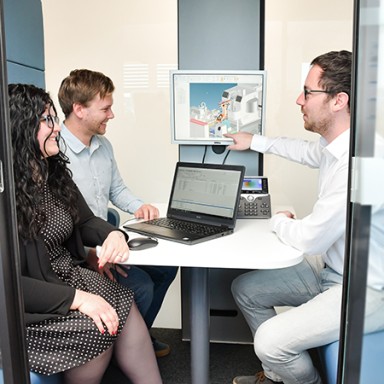A conversation with Alexander Bentele and Christian Roth, Project Management: The Big Picture
Led by Alexander Bentele (Gear Technology) and Christian Roth (Automation Systems), Project Management at Liebherr-Verzahntechnik GmbH keeps an eye on the big picture in the company.
Christian and Alexander are Allgäu born and bred and both studied industrial engineering in Kempten. Alexander had already worked at Liebherr in Kempten as a student trainee during his degree program. After some time in Project Planning, he became head of Project Management in 2022. Christian, on the other hand, worked for a number of years at various automotive manufacturers. After some time, however, he returned to his roots and has worked in project management at Liebherr since 2019.
In this interview they provide us with insights into the nature of the work as well as the challenges of project management, and they reveal the must-have skill sets project managers need in order to thrive at Liebherr.

Alexander Bentele, Head of Project Management, Gear Technology
What is the task of project management?
Alexander: Project managers support both customers and internal departments, from the time the order is received all the way to machine acceptance. They work from a project plan, monitoring the project's progress, identifying and solving problems, managing resources and of course communicating with the project team and other stakeholders. The goal? To successfully conclude the project on schedule and on budget.
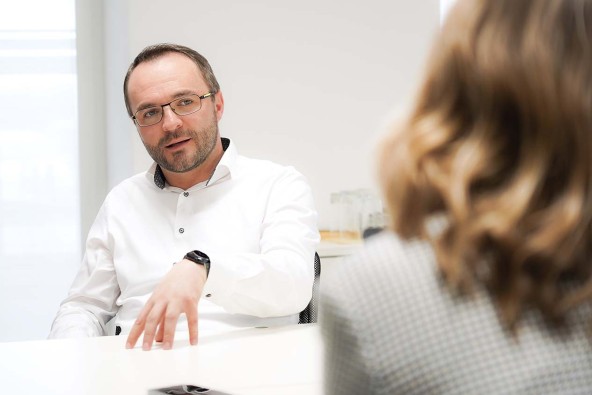
Christian Roth, Head of Project Management, Automation Systems
Christian: That's right. Project management has to hold all the various strands together and make sure that everyone involved in the project understand what needs to be done and when. They also have to make sure that resources and information are provided so that project participants can complete their tasks. And they're the main contact points for colleagues and customers. That means, for example, that nobody has to call around to absolutely everyone in the whole company for one small piece of information. Instead there's a central point of contact for all issues.
Why did you both choose project management?
Christian: I've never been that guy who was always laser-focused only on engineering. I'm interested in the big picture. I want to understand each station a machine runs through within the organization and how the different departments work together. I'm a communicator by nature, so project management is perfect for me. I have a good understanding of almost all departments in the organization. I understand our customers as well and keep in close contact with all of them. Coordination and communication is actually really fun for me.
For me, what's really exciting is having much more contact with our customers.
Alexander: The project management for Gear Technology was restructured as part of a strategy project and I had the good fortune of leading this project in collaboration with other departments such as Design and Sales. But then there was the question of who was going to lead the team after the restructuring was finished in 2022. After nine years in production planning, I was ready for a change of scene.
For me, what's really exciting is having much more contact with our customers. Of course, I always communicated with our customers in my previous position, but now, standing alongside Sales as the face of the company gave me entirely new insights.
Was moving from Production Planning to Project Management a big change for you?
Alexander: My work in Production Planning already gave me insights into the company's processes. However there were and still are a lot of new things to learn. The major difference was the intense customer contact, as we've already discussed. Whether things are going well or not exactly according to plan, ours is the first phone to ring. At that point, you have to understand the interests of the customer and communicate them, while finding an efficient and results-oriented solution.
The job of project manager is basically about motivating everyone involved and convincing them of your vision, and it's also often about resolving difficult situations. To do so, you have to understand people and how best to work with them.
What kinds of skills does a project manager need to have?
Christian: Communication is key. And I don't just mean someone who likes talking and is a great conversationalist. You need to have good instincts when it comes to interpersonal relationships. The job of project manager is about motivating everyone involved and convincing them of your vision, and it's also often about resolving difficult situations. To do so, you have to understand people and how best to work with them. Of course, this is also the case when communicating with external stakeholders. In my view, it's those soft skills that are important right from the get-go. Relationships clearly take priority over technical skills.
Product-specific knowledge is something I can teach. It's obviously great if our employees already know something about the sector and can tell the difference between a vacuum cleaner and a gripper robot. But extensive knowledge of automation is not essential. That gets taken care of during an employee's initial training.
Alexander: That's right. Communication is everything, including a certain degree of intercultural competence. We have customers from all over the world so you have to keep cultural differences in mind when you're talking to people in order to avoid certain misunderstandings. We can also provide training on that topic to our employees.
I would say that for Gear Technology, technical knowledge also plays a slightly bigger role. Our machines are very specialized and our acceptance procedures with our customers are intense. They don't need to be experts that's why we have our specialists in the various departments, but they definitely should have a good working knowledge of the processes and the workpieces. We place a lot of value on that.
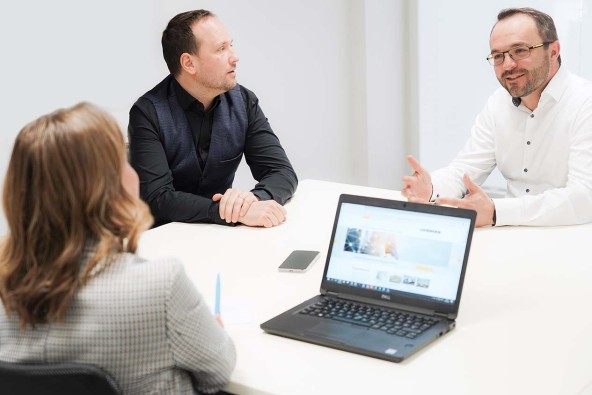
What are the major challenges in project management?
Alexander: Regardless of how good your planning is, unfortunately, not every project goes according to plan. There are often external influences which can really throw a wrench in the works as far as scheduling is concerned such as capacity problems, delays. Project Management has to be armed and ready to deal with it all. Project managers have to be able to respond quickly, reassess, improve the plan and adapt. This results in challenging situations for us as project managers, since we sell highly individualized and specialized machines and systems and no two projects are the same.
Christian: The challenges really depend on the situation. Right now, we're all having to battle the procurement market. Delays in the delivery of electronic components, in particular, are making it unbelievably difficult to plan things in advance. This problem is not unique to Liebherr, the entire market is affected. The calls from customers for shorter delivery times are getting louder and louder, while the procurement market seems unable to recover quickly enough. The fact that we have no standard products and therefore can't really preorder inventory also makes it difficult for us. This is one of those situations where you just have to be honest with the customer and let the quality of our products speak for itself.
"Random bin picking" for feeding car body parts
Liebherr-Verzahntechnik GmbH supplied a complete robot cell for automated, flexible parts feed as a bin picking solution for the line entrance of a body shop at the BMW Group's Dingolfingen plant. The robot's task is to pick up the car body parts and feed them to the spot welding system including double component recognition and high-precision intermediate storage area in a latch.
What has been your biggest highlight so far during your time at Liebherr?
Christian: For me it was a robot cell which we supplied to the BMW Group for an automated parts feed in a body construction plant. That was one of the first projects I had the opportunity to see through at Liebherr. We saw it all - everything from perfect processes to unforeseen problems. But everyone in the entire project team had a great attitude, and everyone really pulled together to overcome challenges and bring the project over the finish line. The customer was a key part of the project team and was just as motivated as we were to bring an outstanding project to life. It's essential to have this kind of mindset across all departments if you're going to have a successful project that you can really feel good about.
I remember one evening in particular when we were still sitting there at half past seven because the system just wasn't doing what it was supposed to be doing. The software programmers and the design engineer were also there, working on the problem with us. Our general manager at the time came by and was surprised that we were still at work. He ordered a pizza. So we enjoyed a nice dinner together and just tried to take a step back and find another way of looking at the problem. And, lo and behold, suddenly a new solution just presented itself. That was really great. Just a few weeks ago, I received an email from the BMW group with a video of the system, showing how well the automation was working.
Alexander: I've been in Project Management for just under a year and, in this short time, haven't seen too many projects through from beginning to end. But I've been part of Liebherr for quite a while and have definitely seen a lot in my day. I find it particularly rewarding when joint efforts result in tangible improvements. A few years ago, for example, we often had situations in production where material wasn't flowing within the company according to plan. We always found a solution to the problem to avoid production coming to a standstill, but it cost us a lot in time and energy.
Then we analyzed the problem a little more closely across all departments. We all asked ourselves, what's our main objective here? How can we measure that objective and what will it take to achieve it? This gave us the basis for developing a system which provides better process overviews and specifies precise key figures for measuring our targets. This took some of the emotion out of discussions, and we were able to find solutions based on facts. Arriving at positive achievements thanks to your own hard work and finding a real sense of togetherness in the process is enormously motivating.
What makes Liebherr stand out as an employer for you?
Alexander: The autonomy and freedom of action that I've been given. Here the hierarchies are flat, and this enables employees to actively contribute and implement their ideas and suggestions without having to basically run to the general manager every time they want to order a ballpoint pen. I really value that.
The social component is also worth highlighting here. Liebherr is a family business which retains its employees even in times of crisis. That cannot be taken for granted, and it's now quite unique in industry.
Christian: The importance of this aspect cannot be overstated. During the pandemic in particular, we experienced this first hand. A number of companies are quite envious of us, for example, companies which are listed on the stock exchange. People come first.
What I would like to emphasize is that we as a family business operating at an international level really have the best of both worlds. On the one hand, the working environment is very informal and the atmosphere is down to earth. The Liebherr family are very accessible and you frequently see them at events or in the middle of the action at Christmas parties. On the other hand, the size of the company and the sites and customers we have all around the world mean that you also enjoy the benefits of a large corporate group.
